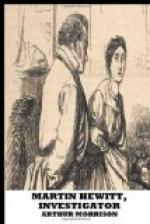Wilks fidgeted, finished his drink, and expressed his intention of going. “Very well, if you won’t have another——” replied Hewitt. But he had gone.
“Good!” said Hewitt, moving toward the door; “he has suddenly developed a hurry. I shall keep him in sight, but you had better take a cab and go straight to Euston. Take tickets to the nearest station to Radcot—Kedderby, I think it is—and look up the train arrangements. Don’t show yourself too much, and keep an eye on the entrance. Unless I am mistaken, Wilks will be there pretty soon, and I shall be on his heels. If I am wrong, then you won’t see the end of the fun, that’s all.”
Hewitt hurried after Wilks, and I took the cab and did as he wished. There was an hour and a few minutes, I found, to wait for the next train, and that time I occupied as best I might, keeping a sharp lookout across the quadrangle. Barely five minutes before the train was to leave, and just as I was beginning to think about the time of the next, a cab dashed up and Hewitt alighted. He hurried in, found me, and drew me aside into a recess, just as another cab arrived.
“Here he is,” Hewitt said. “I followed him as far as Euston Road and then got my cabby to spurt up and pass him. He had had his mustache shaved off, and I feared you mightn’t recognize him, and so let him see you.”
From our retreat we could see Wilks hurry into the booking-office. We watched him through to the platform and followed. He wasted no time, but made the best of his way to a third-class carriage at the extreme fore end of the train.
“We have three minutes,” Hewitt said, “and everything depends on his not seeing us get into this train. Take this cap. Fortunately, we’re both in tweed suits.”
He had bought a couple of tweed cricket caps, and these we assumed, sending our “bowler” hats to the cloak-room. Hewitt also put on a pair of blue spectacles, and then walked boldly up the platform and entered a first-class carriage. I followed close on his heels, in such a manner that a person looking from the fore end of the train would be able to see but very little of me.
“So far so good,” said Hewitt, when we were seated and the train began to move off. “I must keep a lookout at each station, in case our friend goes off unexpectedly.”
“I waited some time,” I said; “where did you both go to?”
“First he went and bought that hat he is wearing. Then he walked some distance, dodging the main thoroughfares and keeping to the back streets in a way that made following difficult, till he came to a little tailor’s shop. There he entered and came out in a quarter of an hour with his coat mended. This was in a street in Westminster. Presently he worked his way up to Tothill Street, and there he plunged into a barber’s shop. I took a cautious peep at the window, saw two or three other customers also waiting, and took the opportunity to rush over to a




